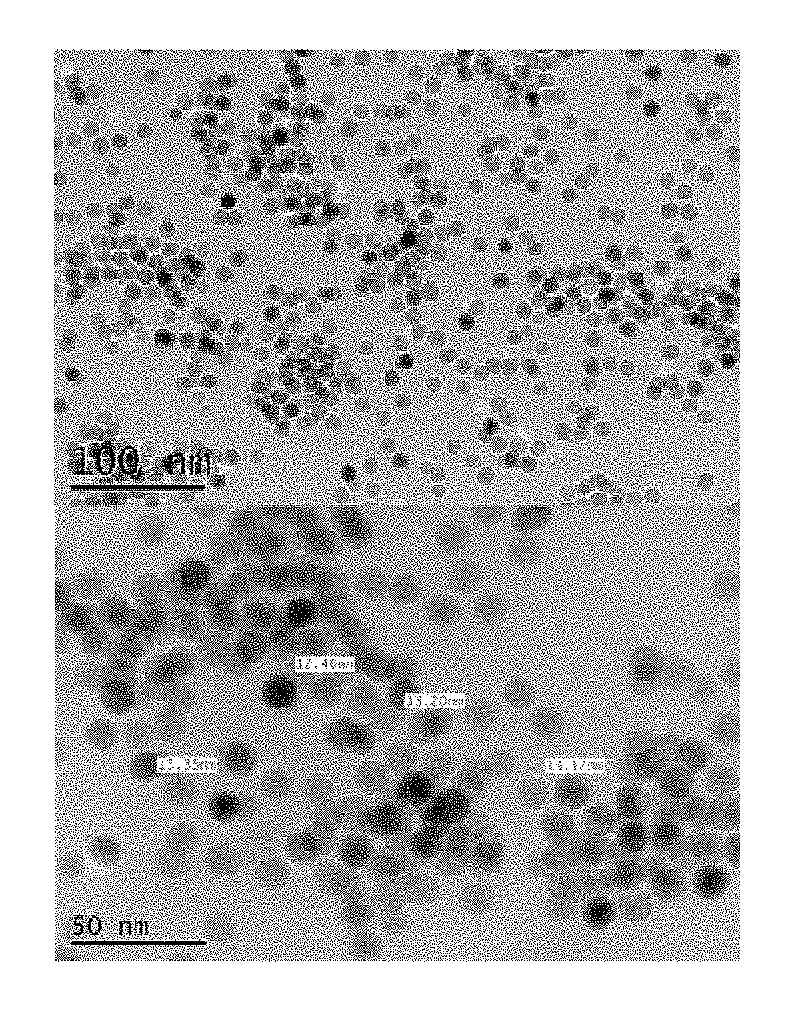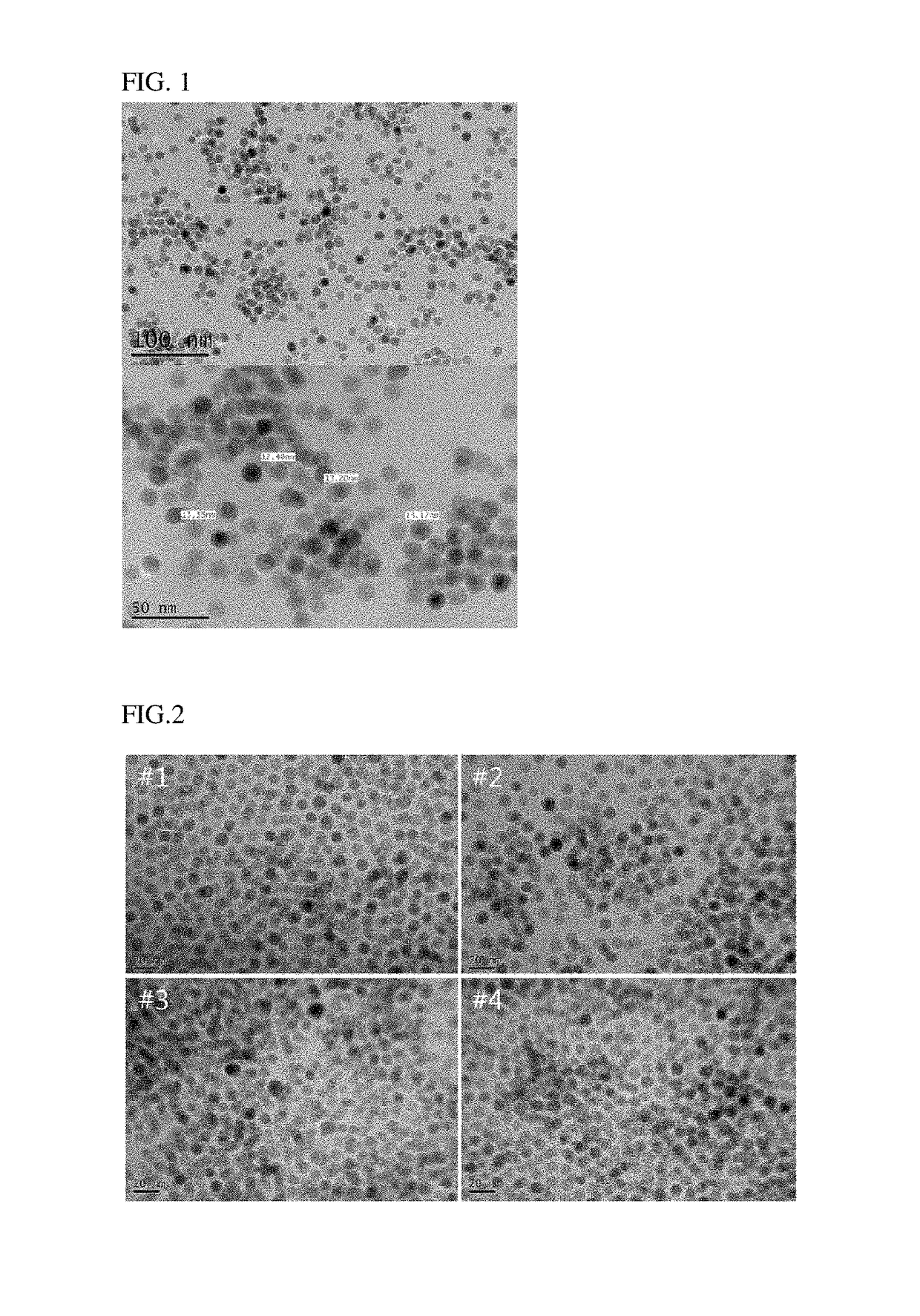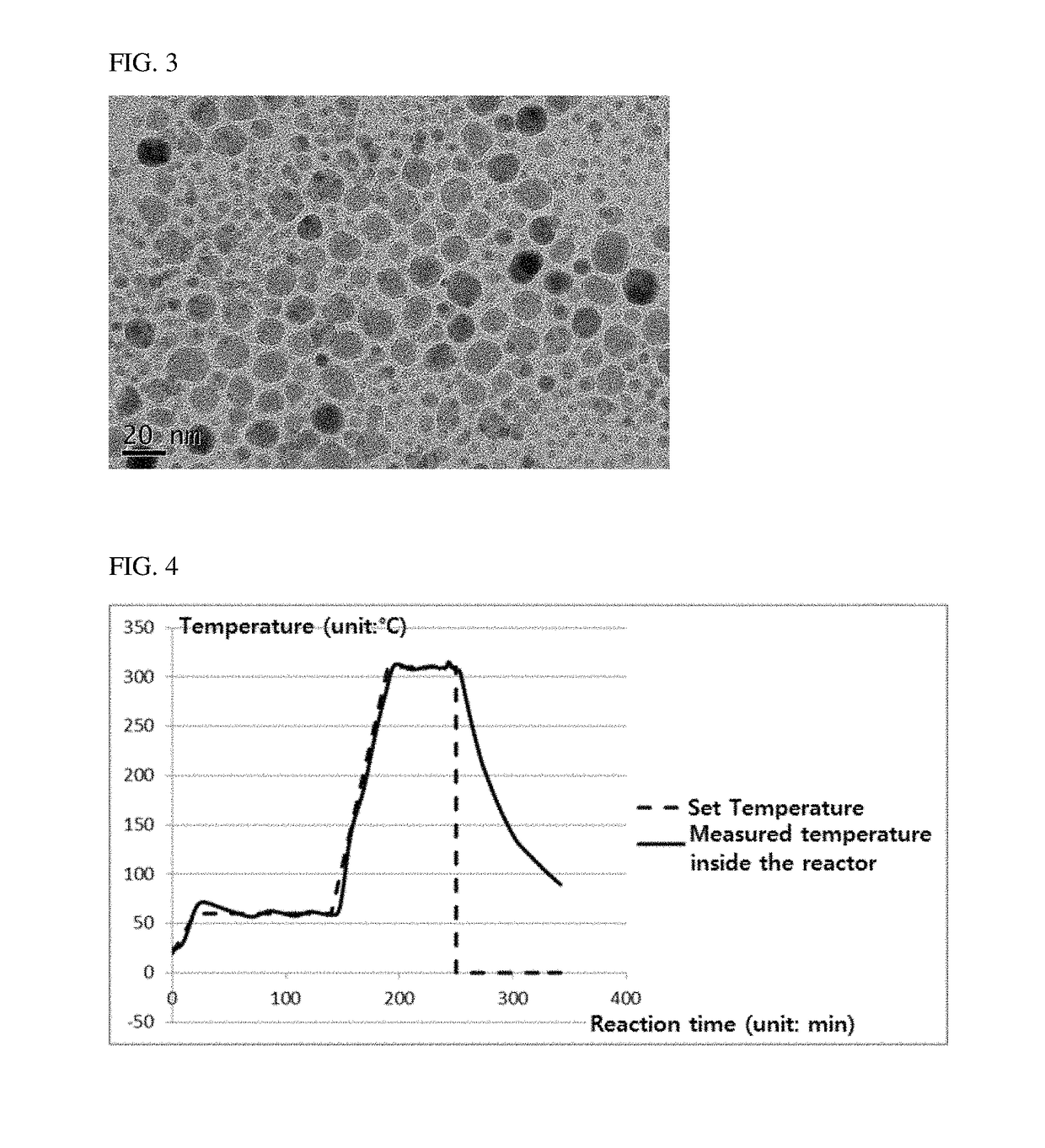Method for preparing uniform metal oxide nanoparticles with high reproducibility
a metal oxide nanoparticle and reproducibility technology, applied in the direction of manganese oxide/hydroxide, chromium oxide/hydrate, vanadium compounds, etc., can solve the problems of difficult production of uniformly sized nanoparticles, reduced crystallinity, and difficult uniform particle shapes of nanoparticles obtained by the method, so as to maintain the temperature and pressure inside the reactor, increase the reproducibility between batches, and increase the uniformity of nanoparticles formed
- Summary
- Abstract
- Description
- Claims
- Application Information
AI Technical Summary
Benefits of technology
Problems solved by technology
Method used
Image
Examples
example 1
[0062]7.1 g of iron hydroxide (Sigma), 90.3 g of oleic acid and 100 g of octadecene were put in a 1 L round-bottom three-neck flask and placed in a mantle having the functionality of magnetic stirring. A magnet for stirring was put in a flask. A trap was installed at the top of the flask, and a cooler was installed thereon. The nitrogen injection and vacuum pump connecting line was installed on one side of inlet, and a thermometer for temperature control was installed on another side. Using a vacuum pump, the inside of the flask was created in a vacuum state and the temperature was raised at a rate of 2° C. / min up to 60° C. and then maintained at 60° C. for 2 hours.
[0063]Next, nitrogen gas was injected into the flask until it reaches the normal pressure (1 atm) and the condition was changed to an inert atmosphere. The temperature of the mixed solution was raised at a rate of 5° C. / min up to 310° C., then maintained at 310° C. for 1 hour, and then naturally cooled to the room tempera...
example 2
[0066]7.1 g of iron hydroxide (Alfa Aesar), 90.3 g of oleic acid and 100 g of octadecene were put in a 1 L round-bottom three-neck flask and placed in a mantle having the functionality of magnetic stirring. A magnet for stirring was put in a flask. A trap was installed at the top of the flask, and a cooler was installed thereon. The nitrogen injection and vacuum pump connecting line was installed on one side of inlet, and a thermometer for temperature control was installed on another side. Using a vacuum pump, the inside of the flask was created in a vacuum state and the temperature was raised at a rate of 2° C. / min up to 60° C. and then maintained at 60° C. for 2 hours.
[0067]Next, nitrogen gas was injected into the flask until it reaches the normal pressure (1 atm) and the condition was changed to an inert atmosphere. The temperature of the mixed solution was raised at a rate of 5° C. / min up to 320° C., then maintained at 320° C. for 4 hours, and then naturally cooled to the room t...
experimental example
[0073]Observation of Nanoparticles
[0074]The nanoparticles obtained in Examples 1, 2 and Comparative Example 1 were observed using a transmission electron microscope (TEM). In Comparative Example 1, the nanoparticles were not properly formed and thus observed by sampling a supernatant.
[0075]FIGS. 1 to 3 are photographs obtained by observing the nanoparticles obtained in Examples 1, 2 and Comparative Example 1 using a transmission electron microscope (TEM), respectively.
[0076]Referring to FIGS. 1 to 3, the nanoparticles obtained in accordance with Examples 1 and 2 of the present invention showed that the particle size was very uniform, but the nanoparticle in accordance with Comparative Example 1 showed that the particle size distribution was irregular.
[0077]Measurement of the Distribution of the Nanoparticles
[0078]In Example 1, the maximum value, minimum value, average, standard deviation, coefficient of variation (CV, standard deviation / average×100) are shown in Table 1 below.
[0079]...
PUM
| Property | Measurement | Unit |
|---|---|---|
| boiling point | aaaaa | aaaaa |
| temperature | aaaaa | aaaaa |
| particle size | aaaaa | aaaaa |
Abstract
Description
Claims
Application Information
 Login to View More
Login to View More - R&D
- Intellectual Property
- Life Sciences
- Materials
- Tech Scout
- Unparalleled Data Quality
- Higher Quality Content
- 60% Fewer Hallucinations
Browse by: Latest US Patents, China's latest patents, Technical Efficacy Thesaurus, Application Domain, Technology Topic, Popular Technical Reports.
© 2025 PatSnap. All rights reserved.Legal|Privacy policy|Modern Slavery Act Transparency Statement|Sitemap|About US| Contact US: help@patsnap.com



